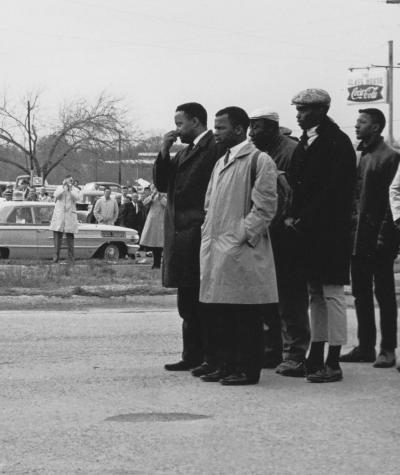On March 7, 1965, in Selma, Alabama, approximately 600 civil rights advocates set out to march to Alabama’s capital, Montgomery, to demand voting rights for Black Americans in the face of discriminatory laws and practices.
At the time, Black voters faced numerous obstacles when trying to register to vote, including literacy tests, poll taxes, intimidation and outright violence. Civil rights leaders organized this march to demand an equal opportunity to participate in our democracy.
As the marchers peacefully crossed Selma’s Edmund Pettus Bridge, local police, vigilante groups and state troopers violently attacked them.
Many marchers were hospitalized as a result of this attack, which was televised nationwide and became known as “Bloody Sunday.” In addition, the events leading up to this day and the weeks after resulted in the deaths of three civil rights advocates.
The brutality of Bloody Sunday highlighted the urgent need for change and galvanized support for the Civil Rights Movement across the country. Two weeks later, the Reverend Dr. Martin Luther King, Jr. and 3,200 civil rights protesters completed the 54-mile march from Selma to Montgomery.
Their sustained advocacy in the face of violent opposition prompted Congress to pass the Voting Rights Act (VRA).
Just a few months later, on August 6, 1965, the VRA was signed into law, prohibiting racial discrimination in voting. The VRA was passed to fulfill the promise of the 15th Amendment, which guarantees that the right to vote cannot be denied on account of race.
Since its passage, the VRA has been crucial in the fight to ensure that no American is denied access to the ballot box because of their race.
The VRA has been used to block unfair maps that discriminate against Black voters and block laws that make it more difficult for voters to make their voices heard.
Thanks to these efforts of civil rights advocates, historically disenfranchised Americans were able to fully participate in the democratic process for the first time.
Today, the VRA continues to ensure protection of these hard-fought rights.
Unfortunately, Supreme Court decisions like Shelby County v. Holder and Brnovich v. Democratic National Committee have weakened the protections of the VRA, opening the doors for more states to implement discriminatory voting rules.
These laws make it harder for all voters — but especially voters of color — to cast their ballots, dishonoring the legacy of the long-fought battle for voting rights.
Sixty years later, there is still work to do in Alabama and across the country to protect and expand the freedom to vote.
In Alabama, the legacy of Selma lives on with Campaign Legal Center’s many local partners who continue this work, including Greater Birmingham Ministries, League of Women Voters of Alabama, Alabama Coalition for Immigrant Justice, Southern Poverty Law Center, Alabama Disabilities Advocacy Program, Alabama State Conference of the NAACP, and ACLU of Alabama.
Together, we have filed lawsuits against unfair voter purges, laws that ban civic engagement work and helping voters, and discriminatory felony disenfranchisement laws.
On the anniversary of Bloody Sunday, we remember the legacy of civil rights leaders who fought for a truly inclusive democracy and pledge ourselves to supporting the continuing fight for the freedom to vote for all Americans.

